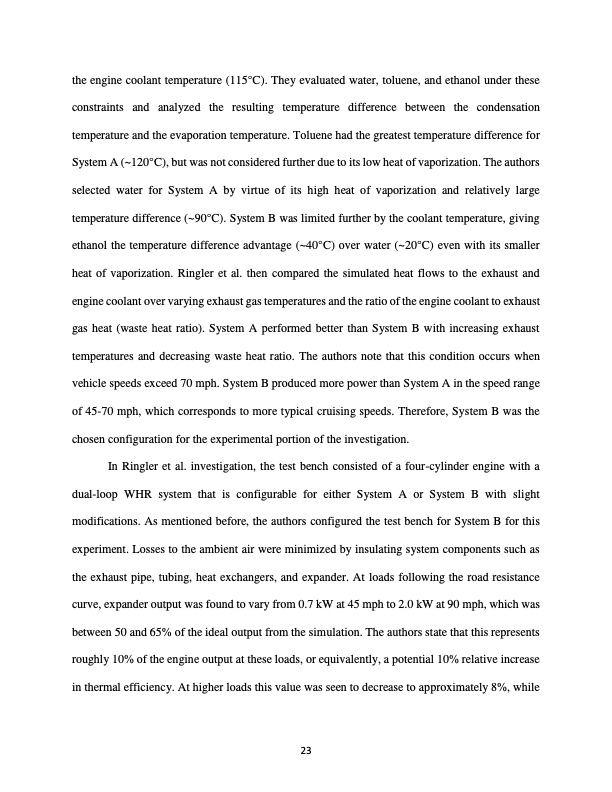
PDF Publication Title:
Text from PDF Page: 045
the engine coolant temperature (115°C). They evaluated water, toluene, and ethanol under these constraints and analyzed the resulting temperature difference between the condensation temperature and the evaporation temperature. Toluene had the greatest temperature difference for System A (~120°C), but was not considered further due to its low heat of vaporization. The authors selected water for System A by virtue of its high heat of vaporization and relatively large temperature difference (~90°C). System B was limited further by the coolant temperature, giving ethanol the temperature difference advantage (~40°C) over water (~20°C) even with its smaller heat of vaporization. Ringler et al. then compared the simulated heat flows to the exhaust and engine coolant over varying exhaust gas temperatures and the ratio of the engine coolant to exhaust gas heat (waste heat ratio). System A performed better than System B with increasing exhaust temperatures and decreasing waste heat ratio. The authors note that this condition occurs when vehicle speeds exceed 70 mph. System B produced more power than System A in the speed range of 45-70 mph, which corresponds to more typical cruising speeds. Therefore, System B was the chosen configuration for the experimental portion of the investigation. In Ringler et al. investigation, the test bench consisted of a four-cylinder engine with a dual-loop WHR system that is configurable for either System A or System B with slight modifications. As mentioned before, the authors configured the test bench for System B for this experiment. Losses to the ambient air were minimized by insulating system components such as the exhaust pipe, tubing, heat exchangers, and expander. At loads following the road resistance curve, expander output was found to vary from 0.7 kW at 45 mph to 2.0 kW at 90 mph, which was between 50 and 65% of the ideal output from the simulation. The authors state that this represents roughly 10% of the engine output at these loads, or equivalently, a potential 10% relative increase in thermal efficiency. At higher loads this value was seen to decrease to approximately 8%, while 23PDF Image | WASTE HEAT RECOVERY FROM A HIGH TEMPERATURE DIESEL ENGINE

PDF Search Title:
WASTE HEAT RECOVERY FROM A HIGH TEMPERATURE DIESEL ENGINEOriginal File Name Searched:
Adler_colostate_0053N_14539.pdfDIY PDF Search: Google It | Yahoo | Bing
NFT (Non Fungible Token): Buy our tech, design, development or system NFT and become part of our tech NFT network... More Info
IT XR Project Redstone NFT Available for Sale: NFT for high tech turbine design with one part 3D printed counter-rotating energy turbine. Be part of the future with this NFT. Can be bought and sold but only one design NFT exists. Royalties go to the developer (Infinity) to keep enhancing design and applications... More Info
Infinity Turbine IT XR Project Redstone Design: NFT for sale... NFT for high tech turbine design with one part 3D printed counter-rotating energy turbine. Includes all rights to this turbine design, including license for Fluid Handling Block I and II for the turbine assembly and housing. The NFT includes the blueprints (cad/cam), revenue streams, and all future development of the IT XR Project Redstone... More Info
Infinity Turbine ROT Radial Outflow Turbine 24 Design and Worldwide Rights: NFT for sale... NFT for the ROT 24 energy turbine. Be part of the future with this NFT. This design can be bought and sold but only one design NFT exists. You may manufacture the unit, or get the revenues from its sale from Infinity Turbine. Royalties go to the developer (Infinity) to keep enhancing design and applications... More Info
Infinity Supercritical CO2 10 Liter Extractor Design and Worldwide Rights: The Infinity Supercritical 10L CO2 extractor is for botanical oil extraction, which is rich in terpenes and can produce shelf ready full spectrum oil. With over 5 years of development, this industry leader mature extractor machine has been sold since 2015 and is part of many profitable businesses. The process can also be used for electrowinning, e-waste recycling, and lithium battery recycling, gold mining electronic wastes, precious metals. CO2 can also be used in a reverse fuel cell with nafion to make a gas-to-liquids fuel, such as methanol, ethanol and butanol or ethylene. Supercritical CO2 has also been used for treating nafion to make it more effective catalyst. This NFT is for the purchase of worldwide rights which includes the design. More Info
NFT (Non Fungible Token): Buy our tech, design, development or system NFT and become part of our tech NFT network... More Info
Infinity Turbine Products: Special for this month, any plans are $10,000 for complete Cad/Cam blueprints. License is for one build. Try before you buy a production license. May pay by Bitcoin or other Crypto. Products Page... More Info
| CONTACT TEL: 608-238-6001 Email: greg@infinityturbine.com | RSS | AMP |